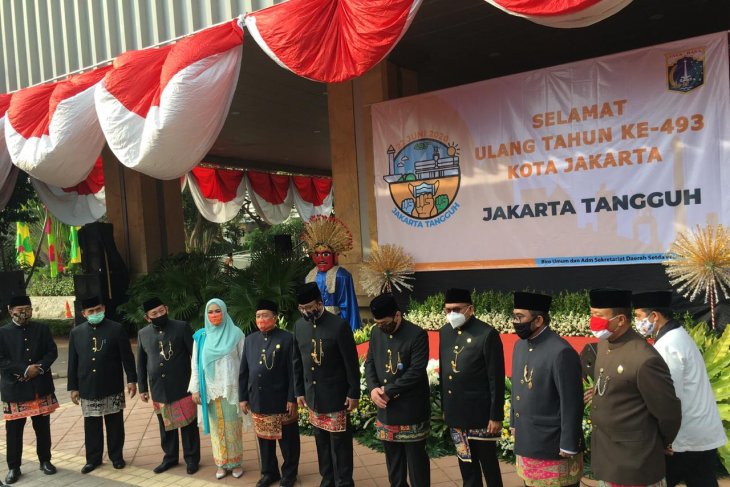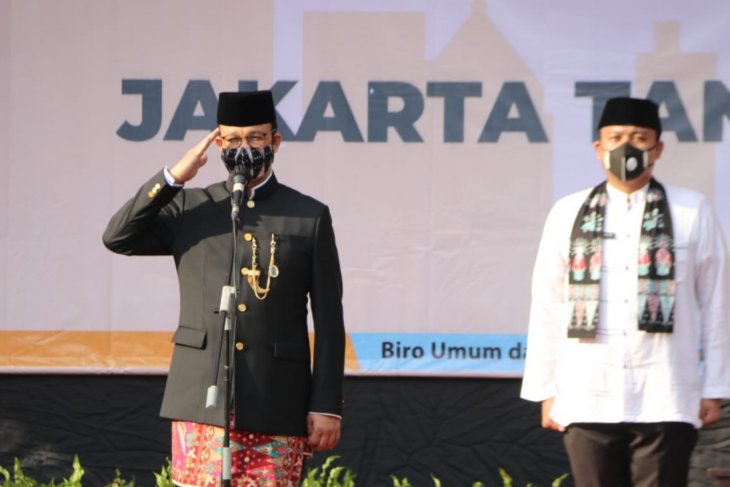Live Streaming
Program Highlight
Company Profile
June
Jakarta's R Number Dipping to 0.98 as Anniversary Present: Baswedan
Written by Ani Hasanah The provincial government officials after Jakarta's 493rd anniversary commemoration held at the city hall, Monday, June 22, 2020. (ANTARA/HO-Official Documentation)
The provincial government officials after Jakarta's 493rd anniversary commemoration held at the city hall, Monday, June 22, 2020. (ANTARA/HO-Official Documentation)
A scientific study showed that the COVID-19 reproduction number (R number) in Jakarta had declined, indicative of being brought under control and a present on its 493rd anniversary on June 22, Governor Anies Baswedan stated.
"I had just received a report from the team of the Public Health Faculty of the University of Indonesia (UI) that showed that during the past two weeks under the transition period, the outbreak had been brought under control," Baswedan remarked during the anniversary commemoration at the Jakarta city hall on Monday.
The number of COVID-19 cases in Jakarta did not spike as expected since the study shows that today's R value across this provincial area had dropped to 0.98, he pointed out.
On March 16, prior to the government’s enactment of PSBB (the large-scale social distancing), Jakarta had recorded its highest R number value, touching four, while the threshold is 1, based on the assumption that every 100 people infected with COVID-19 would transmit the disease to 400 others.
Before the first period of enactment of PSBB on April 10, the figure had already declined to 1.5, and currently, as it dropped further under one, "it proves the hard work of all Jakartans."
This year's anniversary, bearing the theme "Jakarta Tangguh" (the Tough Jakarta), was chosen by the provincial government since it mirrors the eagerness and perseverance of Jakarta’s residents to fight this pandemic.
"This is such a present for Jakarta's people, as we celebrate the anniversary, since the pandemic that was rampant is currently being brought under control," Baswedan added. (ANTARA)
June
Jakarta Anniversary Virtual Celebration to Proffer Fangled Experience
Written by Ani Hasanah
Jakarta Governor Anies Baswedan. (ANTARA/HO-ppid.jakarta.go.id)
The governor of Jakarta, Anies Baswedan, is optimistic that a virtual celebration to commemorate the capital city’s 493th anniversary, falling on June 22, would offer a new-fangled experience for the community amid the unceasing COVID-19 pandemic.
"This virtual celebration is expected to lend a new experience to the community, as technology will be utilized optimally for social interactions and cultural economic activities, including the experience of city tours, through the use of virtual methods," Baswedan stated at the Jakarta City Hall after holding a welcome ceremony to mark the 493th anniversary of Jakarta on Monday.
Disparate to the anniversary celebrations organized earlier, the Jakarta provincial government decided to not mark Jakarta's anniversary with carnivals or festivals that tend to draw crowds in the wake of the ongoing COVID-19 pandemic.
The governor was also upbeat that the events can be accessed virtually and offer a broader understanding of Jakarta to those residing in Indonesia and other countries.
"In syaa Allah (God willing), in future, it would become a medium to introduce Jakarta to the entire Indonesian community and the world," he affirmed.
The 493th anniversary of Jakarta coincidentally also marks the success achieved by the capital city's administration in curbing the transmission of COVID-19 after a three-month battle.
"This year, the anniversary celebrations are themed 'Jakarta Resilient' to highlight the fact that residents of this city harbor high spirits and demonstrate resilience in the face of tough challenges presented by the COVID-19 pandemic. Alhamdulillah, this pandemic, which was once quite grave in Jakarta, is now brought under control," he emphasized. (ANTARA)
Wakatobi to Reopen Tourist Destinations In July 2020
Written by Nouvarah Ahdiba
The Wakatobi district administration in Southeast Sulawesi Province will re-open tourist destinations for local and foreign tourists as of July 2020.
"We are optimistic of receiving domestic and foreign tourists no later than the start of July 2020 in the wake of the provisions of the COVID-19 health protocols," Nadar, head of the Tourism Office of Wakatobi District, stated here on Monday.
The district, known for its marine tourism, recorded no tourist arrivals since March 2020 following the government's announcement of the country's first confirmed COVID-19 cases and cancellations of all domestic and international flights from and to Wakatobi.
Several travel operators from Jakarta and Bali had contacted the tourism office to inquire when Wakatobi will reopen its region for tourists.
"Currently, the government, through the district and provincial COVID-19 Task Force Teams, had proposed to immediately reopen the district to tourists, albeit through the application of strict health protocols," Nadar remarked.
Currently, only Wings Air is operating flights twice a week from the Haluoleo Airport in Kendari, the capital of Southeast Sulawesi, to Matahora Aiport in Wakatobi, and from Tomia Airport to Denpasar, Bali Island.
"Hence, apart from using air routes, tourists headed for Wakatobi can also opt for means of sea transportation opened via Baubau by ferry and Jet Liner fast ships," he stated.
Several hotels and a resort in Wangi-wangi were also reopened, he remarked.
During the January-February 2020 period, Wakatobi had recorded arrivals of some 28 thousand domestic tourists and six thousand foreign tourists.
Since 1996, Wakatobi has had a conservation area or a national marine park spanning an area of 1.39 million hectares. The park has 25 clusters of coral reef, 600-km-long coastal line, 112 species of coral reef from 13 families, and 93 species of fish. (ANTARA)
Indonesian Government Officially Promulgates Health Protocols for Tourism Sector
Written by Nouvarah Ahdiba
The Indonesian government, through a resolution issued by the Ministry of Health, has officially enforced health protocols for the tourism and creative economy sector.
The health advice has been put together by the Ministry of Tourism and Creative Economy and concerned stakeholders and ministries.
The health protocols for the sector have been ratified by the Health Minister's Resolution, Number HK.01.07/Menkes/382/2020, on Health Protocols for Communities in Public Places and Facilities in the Context of Prevention and Control of Corona Virus Disease 2019 (COVID-19).
In a statement received here on Monday, deputy of strategic policy at the Ministry of Tourism and Creative Economy, R Kurleni Ukar, said the health protocols for the tourism sector and creative economy have been compiled based on three main issues — cleanliness, health, and safety
The health minister’s resolution has laid down protocols for hotels, inns, homestays, hostels, and other accommodations, restaurants, smaller food joints and food services, tourist locations, modes of transportation, creative economy services, event/meeting organization services, as well as other relevant public places and facilities closely affiliated with the tourism sector and the creative economy.
The protocols can be used as a reference by ministries, institutions, provincial regional governments, district and city governments, and the community, including associations, managers, owners, and workers managing public places and facilities as well as visitors, said Kurleni Ukar.
The health protocols are expected to support the plan for gradually reactivating the tourism and creative economy sectors to revive businesses in the field, which have been hit the hardest by the COVID-19 pandemic.
Decisions related to the reactivation, however, will need to be adjusted to the level of risk of COVID-19 spread and a region's ability to control the disease, Kurleni Ukar pointed out.
"Local governments as well as tourism and creative economy businesses are expected to prepare and implement health protocols in accordance with the decision signed by the Minister of Health," he said.
Minister of Tourism and Creative Economy, Wishnutama Kusubandio, lauded the approval of the health protocols for the tourism and creative economy sector.
The endorsement has come through a single channel, which is the Minister of Health, and that ensures the protocols are in harmony with those prescribed by other ministries and institutions, he noted.
"The health protocols have been officially released by the Ministry of Health so that they can become a common reference, and there are no ministries/institutions that issue them independently as it (their implementation) is coordinated," Wishnutama said.
The ministry had also prepared technical guidelines, both in the form of videos and handbooks, that refer to global standards.
The handbook is a more detailed derivative of the protocols signed by the Ministry of Health, which means, it will be easy for the tourism and the creative economy sector to carry out activities, the minister pointed out.
The promulgation of the protocols is an important aspect as tourism is a business that relies heavily on the confidence of domestic and international tourists, he said.
"Gaining trust or confidence (of tourists) is the key to accelerating recovery, so it must be highly considered and implemented," the minister added.
He underlined President Joko Widodo's message in which he said the protocols need to be implemented properly and gradually.
"So that, later on, when the tourism and creative economy sectors are reopened, they can be productive and (people) remain safe from COVID-19. That was a fundamental aspect of the President's directives," the minister said. (ANTARA)




